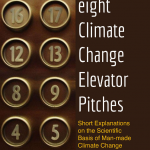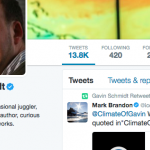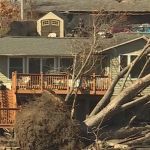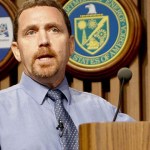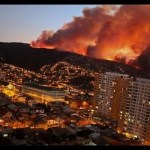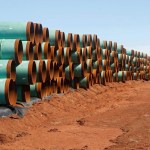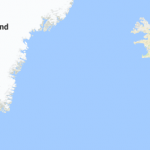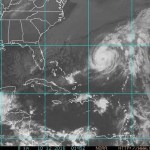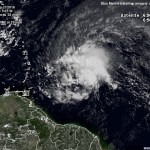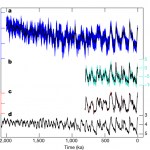global warming
I want to tell you about what may be the most important research result in the area of climate change in recent years. First, a little background.
We know from paleoclimate studies that the Earth's climate system changes from time to time enough to leave a mark. For example, it is widely thought that during the "ice ages" (periods of extensive or moderate glaciation) over the last couple of million years, areas that are currently very dry had a lot more water. Some combination of rain and evaporation (more rain and less evaporation) conspired to fill playas (dried up lakes) or salt lakes (…
[An early version of this essay was originally published on my Forbes blog in 2012. It has been edited and updated.]
Geologic time scales are long – far too long for the human mind to easily comprehend. Over millions, and tens of millions, and hundreds of millions of years, the Earth has changed from something unrecognizable to the planet we see on maps, plastic globes, and photos from space. The Atlantic Ocean didn’t exist eons ago and it will literally disappear in the future as the continental plates continue to shift inch by inch. A visitor from outer space millions of years ago would…
Rob Honeycutt is famous for his many contributions, at Skeptical Science, in the comment threats on my blog, and elsewhere, in defense of climate science, where that defense is largely against the deniers of science and damagers of civilization. (He is also the guy who makes these famous messenger bags) He deserves a lot of credit for all the work he has done in this area.
Over the years, Honeycutt has developed a number of dialogs related to most, possibly all, areas of human caused global warming and climate change. Along with these dialogs, he has also developed some very helpful…
Scott Adams is the creator of Dilbert, the once funny but now highly repetitive cartoon about a nerd who has a job in an office.
Dr. Gavin Schmidt is high up in the top ten list of world class climate scientists. He is Director of the currently under siege GISS Unit of NASA, where much of the climate science done by that agency is carried out. If you read my blog, you've read his work, because you also read RealClimate, where GS writes about climate science in a manner designed to be understandable to the intelligent, honestly interested, thoughtful individual.
Adams has a history of going…
It is now verified that the earliest 2017 tornados -- first tornados of the season -- struck several communities in east-central Minnesota (a few miles north and south of me). So what you say? Especially because it was a mere F1 and didn't hurt anyone!
This is an important event because the earliest recorded tornado of the year in Minnesota was previously March 18th, and that was in 1968. This tornado, striking on March 6th (confirmed yesterday by the NWS) is way earlier than that!
One tornado, near Zimmerman went for nine miles.
A second tornado appears to have passed through the…
Via Media Matters of America. Very interesting segment.
Santer talks about what is is like to be a rogue scientist in a Donald Trump administration.
The words referred to here the twelve words, were part of the 1995 Second Assessment report of the IPCC. That report is regularly updated, and forms the scientific and policy basis for our thinking about climate change at the national and international level. I highly recommend that you have handy at all times what I like to think of as the human-readable version of the most current IPCC report: Dire Predictions, 2nd Edition: Understanding…
There have been significant wildfires in Chile since November, and they continue. These are the worst fires Chile has seen in known history, and Chile has been keeping track of its history for quite a while.
Are these fires climate change caused? Apparently so. Chile has had a rain deficit for well over a decade, though it as been extra dry for about five years. Drought experts call it a "mega-drought." Droughts tend to have climate change links, and this one is no exception. A study from just one year ago links anthropogenic climate change to the drought.
Within large uncertainties in…
The science is clear: Human caused global warming is happening and is serious. Building and expanding infrastructure to make it easier to burn fossil fuels is a very bad idea. The Keystone XL pipeline and the Dakota Access pipeline were two such projects, and in recent years, the environmental community, politicians, and others managed to stop these projects.
Today, President Trump signed an executive order that brings these projects back to life and moves them forward.
From Rhea Suh, president of the National Resources Defense Council:
“It’s appalling that Trump wants to throw open our…
National academies of sciences from around the world have published formal statements and declarations acknowledging the state of climate science, the fact that climate is changing, the compelling evidence that humans are responsible, and the need to debate and implement strategies to reduce emissions of greenhouse gases. Not a single national science academy disputes or denies the scientific consensus around human-caused climate change. A few examples of joint academy statements since 2000 on climate are listed here. Many national academies have, in addition, published their own reports and…
The term "Evangelical" is a bit of a moving goal post. But, there is a strong association between Evangelical and getting climate science totally wrong in a way that is actually materially damaging to our planet and to future generations. So, it is not hard to be angry at Evangelicals because they are ruining it for everyone.
But, within the "Evangelical" movement, there are people who are trying to change that. I wish them luck. One person is Katharine Hayhoe, and here she is talking about that:
Another is my friend Paul Douglas, famous meteorologist. He wrote Caring for Creation: The…
You already know abut the North American Conveyor current. Briefly: The major ocean currents happen because the equatorial ocean is warmer, and since water (unlike land) can move (though not as fast as air) the dissipation of this heat across the surface of the Earth results in warm water moving, at the surface, north or south away from the Equator, where it loses its heat and finds it way back to the equatorial regions, usually as deeper, cooler water.
Conveniently, this process also involves increasing the salinity of the water far from the equator, as evaporating water becomes saltier.…
New research presented at the British Ecological Society, Liverpool shows that reindeer are shrinking. These findings come from a survey conducted between 1994-2010 in Svalbard, a Norwegian island, which found the animals have lost about 12% of their body mass over this timeframe. The research team thinks the shrinking reindeer phenomenon might be caused by global warming as females have increased access to grasslands and give birth to more calves annually than in the past. This translates to less nutrients available to support each gestation causing lower birth weights…
Time to make sure you are stocked up and up to date on your climate science books. First, you will need reference materials throughout the holiday season, because Uncle Bob is going to challenge you more stridently than usual. Climate change deniers have taken over the US government. You are on the run. Underground. Up against the wall. So, you need to be ready. Uncle Bob is coming for you.
Second, you may want to give a few climate change related books away for the holidays. Know any science or social studies teachers? Maybe a nice book for Uncle Bob's wife? Ha, that would be funny. Anyway…
Among the different professional categories, scientists and engineers remain very highly respected by the public, at least compared to politicians, business leaders, the media, and even religious authorities. Part of this is due to the fact that success in the scientific enterprise depends on impartial analysis and independence from political ideology. And yet there are strong connections between science and policy: good policy without good science is difficult; good policy with bad science is impossible. Sure, there is plenty of bad policy made even in the face of contradictory scientific…
Andy Lee Robinson started the recent trend of making compelling graphics about climate change that move. He did a version of the Arctic Ice Death Spiral (a term coined by Joe Romm), which was highly acclaimed but that did not go as viral as it should have at the time. Then, a version with additive ribbon graphs about three years ago. He called that the "waterfall diagram" and it was picked up and used by the BBC at the time. Not long after, he came up with the disappearing block of ice motif. And now, Andy has an updated version, here:
This is ice VOLUME, not the oft cited surface area.…
The Royal Society is the world's oldest extant scientific society. And, it is a place where scientific controversy has a home. Both Huxley and Wilberforce were members back in the 19th century, when young Darwin's ideas were first being knocked around.
More recently, just a few weeks ago, the Royal Society accidentally agreed to host a talk by coal baron and formerly respected science writer Matt Ridley. Matt Ridley has been a great disappointment to us scientists and science teachers. Many of us used his book as a supplementary reading in our evolution courses, for example (Ridley was a…
It turns out that there is an untold story behind the "discovery" of the famous Hockey Stick graph by Mike Mann and his colleagues. It is an excellent example of how science works, worthy of repeating, say, in a science classroom.
Anthropogenic Climate Change is very serious business. And, therefore, there has been far too little humor applied to communicating about this problem. Mike Mann and his co-author Tom Toles have started to backfill that gaping hole in the collective effort to bring the most important existential issue of our time to everyone's attention.
Hurricane Matthew wasn'…
LATEST UPDATE IS HERE. CLICK HERE FOR LATEST UPDATE.
Update: Wed Mid Day
Matthew weakened, strengthened, strengthening
Matthew has interacted with land masses in Hispaniola and Cuba to the extent that the storm weakened quite a bit, losing its temporary Category 5 status.
But, now Matthew is already showing signs of strengthening, and is likely to grow back to Category 3 or 4 status as it moves over the Bahamas. How bad a hurricane is when it makes contact with land depends in large part on the angle of the attack, and Matthew will likely be affecting several spots in the Bahamas at a…
You've probably already heard about his paper because everyone is all a tizzy about it. There is a fundamental complaint being made about one of the paper's conclusions. I've been paying careful attention to what my colleagues are saying about that one aspect of the paper, and I get their point but I'm not sure if they are right. I'll explain that later.
What everyone so far has almost entirely missed, though, is the actual point of the paper, and that is important and while I'm sure it could be improved with further work, this is good stuff and important.
One of the major contributions…

